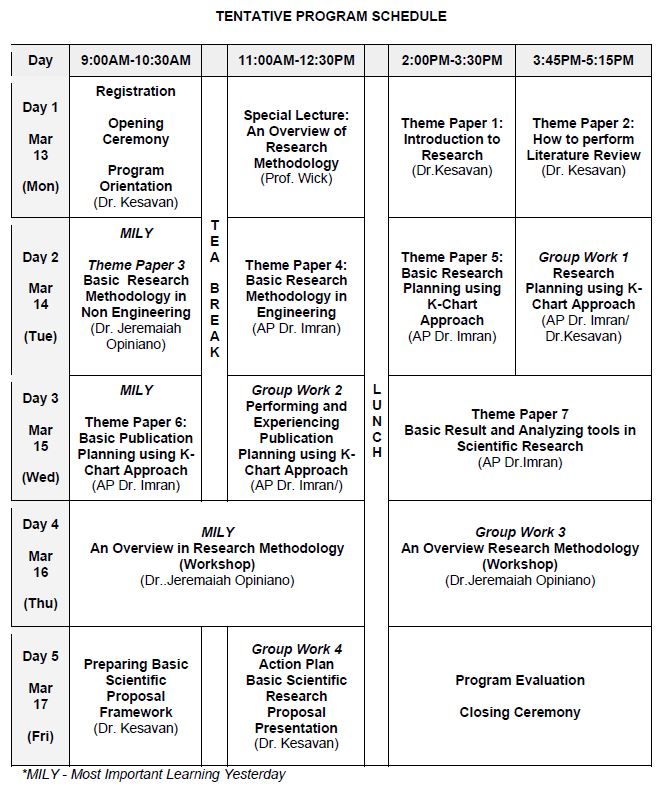
DATE: March 13-17, 2023 |
VENUE: Zoom Platform via online |
ORGANIZERS: Colombo Plan Staff College (CPSC) and Technical Education and Skills Development Authority (TESDA), Philippines |
PARTICIPANTS' PROFILE: The participants of this In-Country Program will be composed of Administrators, Directors, Chief TESD Specialist, Supervising TESDA Specialist/Trainers from TESDA regional offices. |
The knowledge on the Research Methodology is a vital approach in collecting data and Information. Research Methodology has been simply defined as how a researcher systematically designs a study to ensure valid, reliable research aims and objectives. Therefore the techniques will be useful in the preparation, development and discussions will be related to technical vocational studies and beyond.
Research Methodology is determined before research conduction. Correct choice of research methodology helps in determining the success and overall quality of your research study and its documentation. Furthermore, becoming familiar with the research methods used by an area of study allows you to understand it more effectively. In other word Research Methodology is the specific procedures or techniques used to identify, select, process, and analyze information about a topic. In a research paper, the methodology section allows the reader to critically evaluate a study's overall validity and reliability.
Appropriate selection of a research methodology also involves scrutinizing and considering the approaches used by other researchers in the discipline or studies with similar aims and objectives. Researchers from the same disciplines often follow a common methodological approach or set of approaches. While it doesn’t mean we should follow the herd, we should at least consider these approaches and evaluate their merit to your research’s benefit While most methodological approaches will deliver the most scientifically rigorous research design theoretically, the chances of constraints faced practically cannot be overlooked. Hence, it is all the more important to evaluate your research methodology on the basis of its practicality in experimental conditions.
Each research, irrespective of its type (qualitative, quantitative, or mixed), has a different purpose and approach that helps in solving its question. Therefore, the key factor for deciding which research methodology to adopt depends on the nature of your research aims, objectives, and research questions. This is one of the key factors that need to be fine tuned when it comes to the research and publication process. In the TVET sector research and publication is one of the main key elements needed to focus. Proper documentation via publication will lead to producing quality institutions via recognized accreditation for an organization.
CPSC has been continuously working with various organization and agency and other decision makers in the TVET sector across the region via their countries liaison officer to identify key issues which need to be promote to ensure that research and publication culture will take into consideration to enhance knowledge and create awareness of TVET among teachers, lecturers and practitioners.
At the end of the course, participants should be able to:
- To determine and understand the fundamental concept of Research Methodology
- To understand and apply the methods of Research Methodology
- To familiar with the Scientific Process and Beyond in Research Methodology
The presentation and workshop activities are directed towards the formulation of Research Methodology in TVET sector by developing the latest trend known as K-Chart method as a methodology tools for planning and implementations at TVET Institutes for member countries, especially Philippines.
At the end of the program, the participants should be able to craft and develop research methodology via the new technique and methods taught for future Research and Publication in the TVET sector which will be used as a basis and planning for organizational and intuitional future direction.
- Research Methodology Framework
- Action Plan
To achieve the objectives set forth, the following strategies will be employed in a consultative nature:
Presentations and workshops:
Theme Papers (TP)
- Special Lecture: An Overview of Research Methodology
- Theme Paper 1: Introduction to Research
- Theme Paper 2: How to perform Literature Review
- Theme Paper 3: Basic Research Methodology in Non -Engineerin
- Theme Paper 4: Basic Research Methodology in Engineering
- Theme Paper 5: Basic Research Planning using K-Chart Approach
- Theme Paper 6: Basic Publication Planning using K-Chart Approach
- Theme Paper 7: Basic Result and Analyzing tools in Scientific Research
Group Work Activities (GWA)
- GWA 1: Research Planning using K-Chart Approach
- GWA 2: Performing and Experiencing K-Chart Planning
- GWA 3: An Overview on Research Methodology Workshop
- GWA 4: Action Plan-Basic Scientific Research Proposal Framework
The program involves different learning methods such as:
- Theme paper presentations
- Group Work Activities
- Group Presentations
- Web-Based Teaching and Learning System through On COURSE
- Preparing Research Framework
|
|
|
|
|
|
|
|
|
|
|
|















